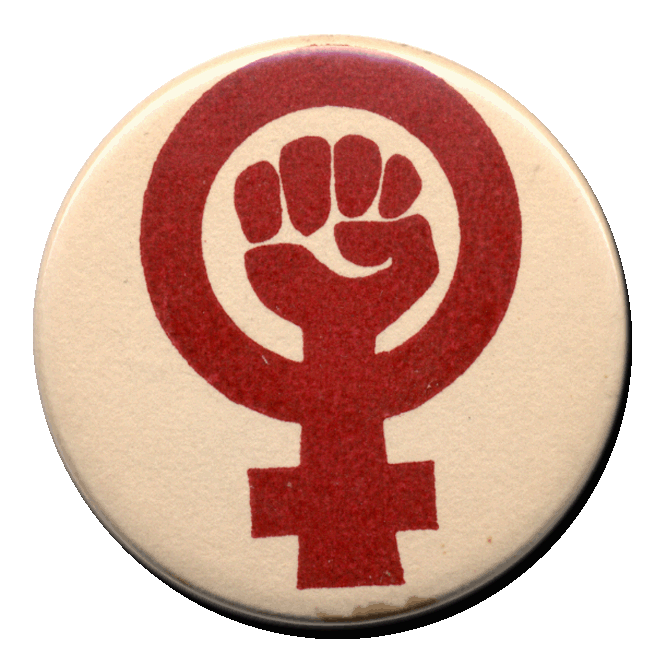„Women together are strong“ is the new slogan. From the fight against § 218 a networked German women’s movement has developed.
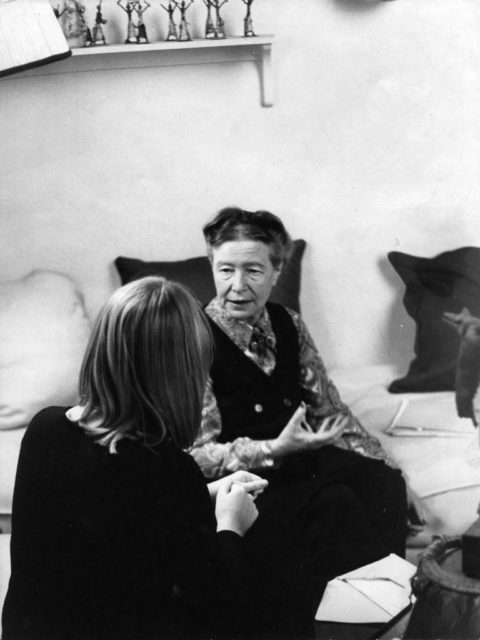
In France, Alice Schwarzer’s first interview with Simone de Beauvoir is published. In it Beauvoir explains her turnaround: Whereas in the „The Second Sex“ (1949) she was still hoping for a „solution of the women’s question through socialism,“ she now declared: „We must fight for the specific situation of the woman even before the dream of socialism comes true.“
The interview quickly spread worldwide in the media and pirated prints. It functioned as a confirmation for the women’s movement by the most important gender theorist. Until 1983 Schwarzer had five more interviews with Beauvoir („Weggefährtinnen im Gespräch“, KiWi).
February 21, 1972
The Cabinet approves of the indication solution. An abortion should now be allowed in the following three cases: In case of danger to the health of the mother (medico-social indication), pregnancy by rape (ethical indication) or disability of the fetus (eugenic indication).
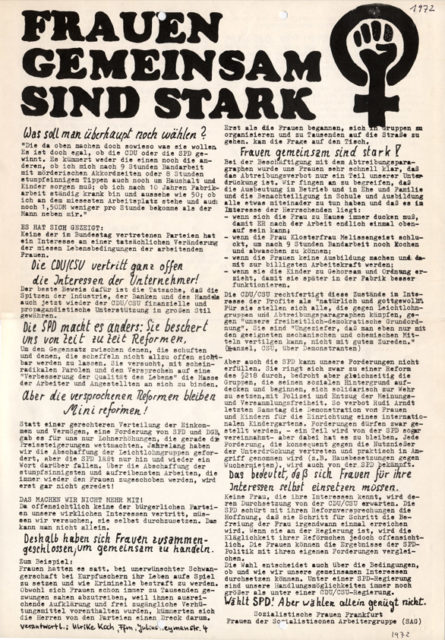
At the beginning of the election year 1972, the Cologne Cardinal Höffner declares, on the subject of § 218: “ Members of parliament who are not prepared to guarantee the inviolability of human life, including the unborn child, are not eligible for election by a devout Christian.“
February 28, 1972
In Frankfurt/M., the women’s groups Revolutionärer Kampf and Aktion 218 jointly issue the newsletter ‚Frauen gemeinsam sind stark’ [Women together are strong]. The topics range from the exploitation of women in the workplace and in the kitchen to rising prices and criminal speculation, to doctor boycotts and beauty contests.
March 1, 1972
After a screening of Rosa von Praunheim’s film It is not the homosexual who is perverse,…, nine women found an autonomous women’s group within the Homosexuellen Aktion Westberlin (HAW).
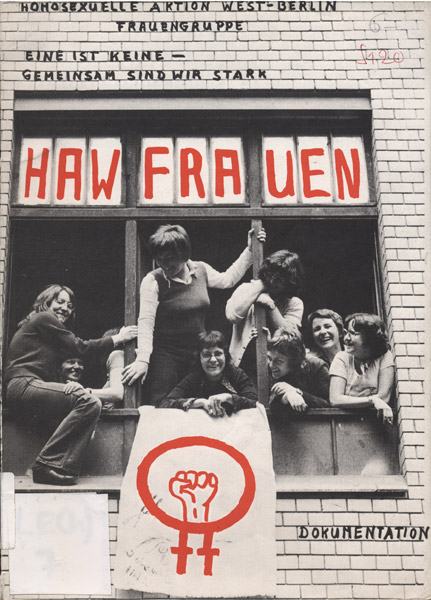
They manifest that the motives and consequences of female and male homosexuality are not identical. They see themselves as feminists and show solidarity with the fight against § 218: „Women, if you think that § 218 would not concern gay women, then you are mistaken. It affects all women, puts all women under control. It forbids them to dispose of their own body. “
March 8, 1972
The Munich the Aktion 218 calls for an International Women’s Day, which until then was only celebrated in the GDR – and ridiculed as ’socialist mother’s day‘. „On March 8, 1908, women in the clothing industry went on strike in the USA. Revolting women have since been celebrating it as World Women’s Day. We want to take up this tradition again! “
March 9, 1972
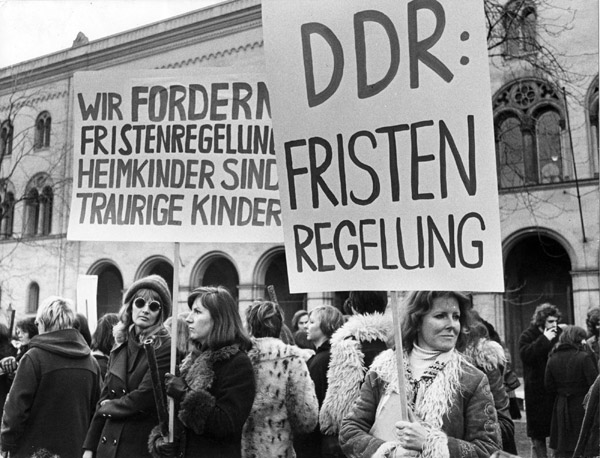
The Volkskammer of the GDR passes the Fristenlösung, which the West German women also demand for. The SED evidently fears a spillover of the women’s movement to the GDR and tries to forestall this through ‚emancipation from above‘. In the GDR, abortion is now exempt from punishment within the first three months.
11th-12th March 1972
Around 400 women from 40 cities meet for the 1st Federal Women’s Congress. In their resolution they state: „Women need to organize themselves because they have to recognize their very own problems and learn to defend their interests. (…) The groups, which emerged largely from the fight against the abortion law, have realized that the oppression of women is to be seen in a broader social context beyond the abortion campaign. “
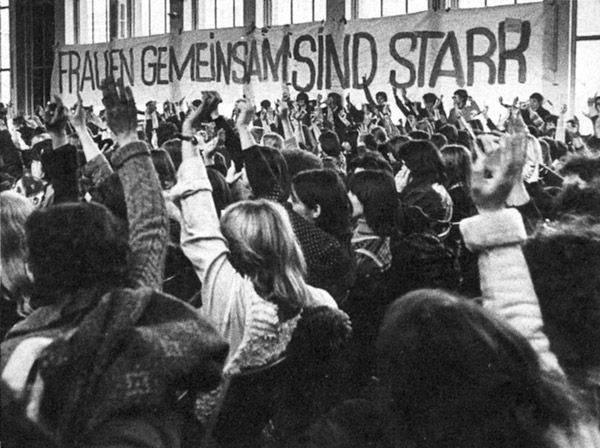
At the end the participants sing the song of the Frankfurt Weiberrat: „Women together are strong“. The press states: The „historic meeting“ set the „signal for an autonomous women’s liberation movement in Germany“. Exactly nine months after the campaign in the Stern, the New German Women’s Movement was born.
April 10, 1972
During an expert hearing on § 218, women of the Aktion 218 unroll a banner in the Bundestag declaring: „Stop the nonsense – abolish 218!“
![Muttertag - Ein Feiertag? (1972). - Frauenaktion 70 [Hrsg.] ; DKP-Frauenarbeitskreis [Hrsg.] ; Weiberrat [Hrsg.], siehe Flugblatt im Bildarchiv (FMT-Signatur: FB.07.047) Muttertag - Ein Feiertag? (1972). - Frauenaktion 70 [Hrsg.] ; DKP-Frauenarbeitskreis [Hrsg.] ; Weiberrat [Hrsg.], siehe Flugblatt im Bildarchiv (FMT-Signatur: FB.07.047)](http://frauenmediaturm.de/wp-content/uploads/2018/07/Flugblatt_Muttertag_ein_Feiertag-768x1024.jpg)
May 8, 1972
The WDR broadcasts a one-hour radio feature about the New Women’s Movement by Alice Schwarzer, who still lives in Paris at the time. Title: „I won’t put up with that anymore – women’s movement in the Federal Republic of Germany and abroad“. (Text manuscript and radio feature in the FMT collection)
May 14, 1972
Women’s groups throughout the country are organizing protests against Mother’s Day. Motto: „Mother’s Day – a holiday? What are we celebrating? Our underpayment? Our unpaid housework? Our illegal abortions? “
Pentecost 1972
The first nationwide meeting of homosexual action groups takes place in Berlin. Around 30 women and 200 men meet on invitation of the HAW. After the Pentecost meeting, the second gay women’s group in Germany is created in Hamburg.
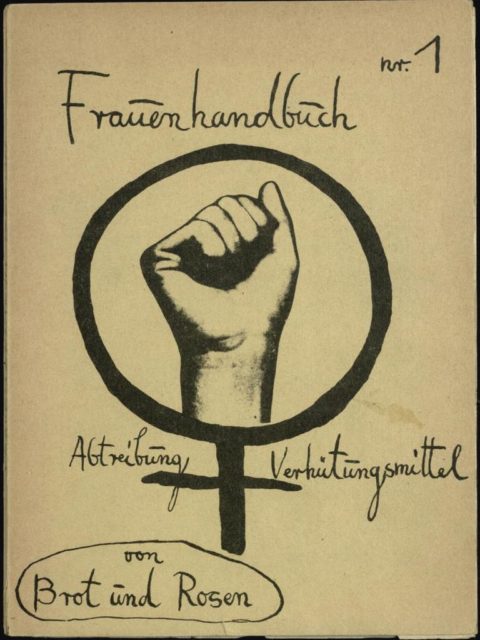
June 11, 1972
In the Cologne Gürzenich approximately 1,200 participants come together to a „tribunal against the § 218“. Politicians, doctors, the church, the judiciary and others are accused of denying women the right to self-determination over their bodies.
August 1972
Following the example of the US-American Women’s Health Movement, the Berlin Women’s Group Brot und Rosen is launching the Frauenhandbuch Abtreibung und Verhütungsmittel [Women’s Guide on Abortion and Contraception]. It is designed to empower women and girls to handle their bodies with confidence. In addition, the manual formulated the first medical-political criticism of the contraceptive pill. The booklet forms the basis of the first women’s health events.
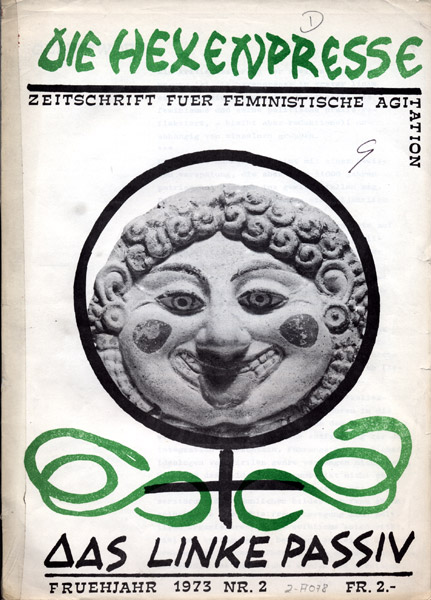
October 1972
In Switzerland, the Hexenpresse – Zeitschrift für feministische Agitation [witch press – journal for feminist agitation] appears. The publisher is the Basel-based Gunhild Feigenwinter. The witch press is the first German-language voice of the autonomous women’s movement.
In Frankfurt/M. the book Frauen gemeinsam sind stark [Women Together are strong] with texts and sources of the American Women’s Liberation is publishes. The editor is the Arbeitskollektiv der Sozialistische Frauen Frankfurt. This is also the beginning of a systematic reception of the analyzes of US-American feminists in Germany.
7th-8th October 1972
At an extraordinary delegates‘ conference in Frankfurt, women’s groups are preparing for the German Bundestag election on the 3rd of December.
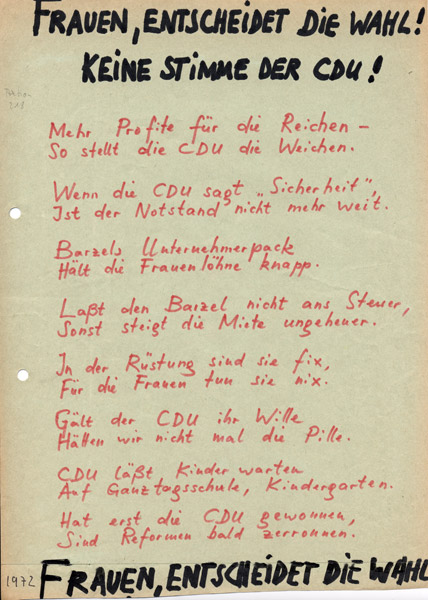
They are setting up the campaign Frauen wählen Frauen [Women elect women], with which they intend to get more female candidates into the top of the list. The proportion of women members of the Bundestag is less than ten percent for all parties.
The campaign Frauen entscheidet die Wahl [Women, decide the election!] is launched: „Women should take their own opinion and not that of their husband to the ballot box.“
December 3, 1972
The SPD wins the general election. The decisive factors, according to election analyzes, are the voices of „progressive women“. Since the mid-1950s, women’s share of the Union has been around ten percent above that of men. In the spirit of optimism characterized by the struggle against § 218 and the renunciation of the traditional role of women, the women now change sides: Their share of votes in the Union and the SPD is almost completely equal.
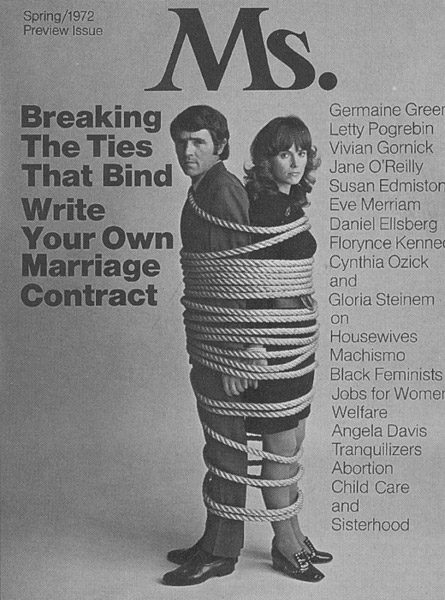
December 13, 1972
With Annemarie Renger (SPD) a woman is elected Bundestag President for the very first time. She will repeatedly distance herself from the women’s movement in the following years.
In the US Ms. magazine appears for the first time. The first feminist audience magazine (editor-in-chief: Gloria Steinem) has great success right from the start. Feminist pioneers had already published a national magazine in 1849. Her name was The Lily and was edited by Amelia Bloomer, the inventor of the trousers of the same name.


